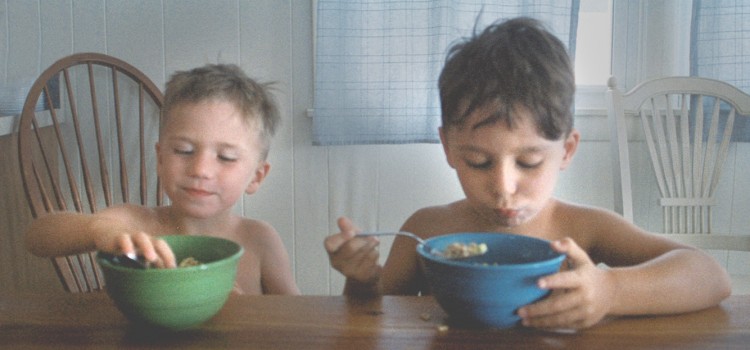Many mother’s are given the advice to start their baby on rice cereal somewhere between 4 and 6 months.
According to David Ludwig, director of he Optimal Weight for Life Program at Children’s Hospital Boston, “There is no scientific basis for this recommendation.”
Here are a few reasons why we opted out of baby cereal after our first baby.
- Highly Processed: Boxed baby cereals are highly processed and enriched with vitamins and minerals. We work as hard as we can to eat real, whole, unprocessed foods, so feeding rice cereal goes directly against our food goals. Check out the list of ingredients in Gerber’s Organic Brown Rice Cereal: Organic Whole Grain Brown Rice Flour, Calcium Carbonate, Organic Soy Lecithin, Choline Bitartrate, Ascorbic Acid (Vitamin C), Electrolytic Iron, Zinc Sulfate, Alpha Tocopherol Acetate (Vitamin E), Niacinamide (A B Vitamin), Riboflavin (Vitamin B2), Thiamin Mononitrate (Vitamin B1), Pyridoxine Hydrochloride (Vitamin B6), Vitamin B12, Folic Acid (A B Vitamin). Can you say all those words… even the ones that aren’t added vitamins? If you want a baby cereal, why not make it yourself? Cook rice or oatmeal, add liquid (water, breastmilk), put it in food processor, and you have a chemical, additive free baby cereal.
- Arsenic in Rice: Consumer Reports released a study last year exposing inorganic arsenic found in rice. In fact they discovered that “that some infant rice cereals, which are often a baby’s first solid food, had levels of inorganic arsenic at least five times more than has been found in alternatives such as oatmeal. Given our findings, we suggest limiting the consumption of rice products.” Of these cereals, Gerber’s Organic Brown Rice was highest in arsenic. Earth’s Best Organic also included unacceptable levels of arsenic.
- Bland: Have you ever tasted rice cereal? It’s bland! Many parents mix in fruit purees or juice to give it a little flavor. Why not just give your baby fruit purees or pieces of pears or bananas? A wide array of food is out there for your baby to experience and get used to. I highly recommend giving them other real foods over baby cereal.
- High in Sugar: Ludwig reports that “White rice — after processing strips away fiber, vitamins and other nutrients — is a nutritional disaster.” It’s “as processed as anything in the food supply” and “the nutritional equivalent of table sugar.” He says that white rice turns to sugar almost instantly and raises blood sugar and insulin levels “while providing virtually no other nutrients.”
- Linked to Diabetes: Studies in The Journal of The American Medical Association have established a connection between introducing infant cereal either too early, or too late, with a link to Diabetes in children who are predisposed to it. However, if breastfeeding, the link is reduced and independent of child’s age at initial exposure.
Need alternative ideas for first foods? Check out the Baby Led Weaning blog for a great list of starting foods!
Did you or will you feed your baby rice cereal?
Photo courtesy of Marina Caprara via Flickr

